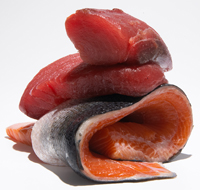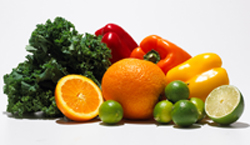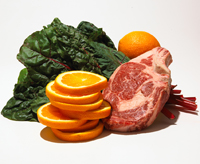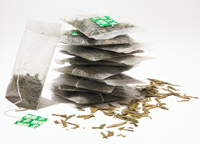
The right supplements can help your heart, sharpen your immune system, and even improve your sex life. The wrong ones, however, can be ineffective or even harmful. "You run into problems because most men are 'prescribing' these things themselves," says Tod Cooperman, M.D., president of consumerlab.com, an independent tester of health and nutritional products. "Don't take supplements with abandon. They should be used carefully, because taking in too much of certain nutrients can cause problems."
We consulted with top doctors, reviewed the latest research, and waded through marketers' claims to bring you nine of the best supplements for men. We also looked for brands that delivered exactly what's on the label -- no sketchy ingredients. (You'll be horrified to find out The 7 Grossest Things in Your Food!)
And remember, we're not suggesting you take all of these -- only that you use this information to guide your choices. What's more, always consult your doctor -- many supplements can interact with other medications -- to fine-tune your strategy.
Fish Oil
Problem: Heart disease
Loaded with the essential omega-3 fatty acids EPA and DHA, fish oil can reduce triglycerides, boost HDL (“good”) cholesterol, and lower blood pressure. But your heart isn't the only beneficiary: The healthy fats may also reduce inflammation and improve cognitive performance.
fish oil can reduce triglycerides, boost HDL (“good”) cholesterol, and lower blood pressure. But your heart isn't the only beneficiary: The healthy fats may also reduce inflammation and improve cognitive performance.
You don't need a prescription to turn around your cholesterol numbers -- just a fork. Make these 12 Food Swaps to Lower Your Cholesterol Levels.
Dose: At least 500 mg DHA and 500 mg EPA daily
Our pick: Kirkland Signature; nordicnaturals.com ($10/400 soft gels)
Natural Sources: Salmon, tuna, or other fatty fish
Psyllium Husk
Problem: Diabetes
This fiber is more than a colon clearer. According to an August 2012 review, the addition of psyllium to your diet reduces blood sugar levels and insulin response. It was also shown to suppress ghrelin, a hormone that makes you hungry. Psyllium is one of five soluble fibers approved by the FDA for lowering LDL cholesterol.
Dose: 20 to 35 g/day, divided and taken with at least 8 ounces of liquid
Our pick: GNC Natural Brand Psyllium Seed Husk; gnc.com ($15)
Natural Sources: Some fortified cereal grains
Quercetin
Problem: Low endurance
Want to extend your cardio session? People who didn't exercise regularly but took 500 mg of this antioxidant twice a day for a week were able to bicycle 13 percent longer than the placebo group, a University of South Carolina study found. Overall, research shows that quercetin can improve your endurance capacity by about 3 percent. Sick of the treadmill? Try one of these 3 New Cardio Workouts You've Never Tried.
Dose: Up to 500 mg, twice a day
Our pick: Jarrow Formulas Quercetin 500; vitaminexpress.com ($24/100 capsules)
Natural Sources: Red wine, parsley, grapefruit, onions, apples
Glucosamine
Problem: Joint pain
One study found that glucosamine, a building block of cartilage, is more effective than acetaminophen (a.k.a. Tylenol) at relieving symptoms of knee osteoarthritis, often caused in younger men by joint injury. Other research suggests that taking glucosamine may play a small role in slowing the progression of osteoarthritis.
Dose: 1,500 mg glucosamine/day
Our pick: Puritan's Pride Glucosamine 1,500 mg; puritan.com ($48/360 caplets)
Natural sources: Crustacean shells
Vitamin C
Problem: Injury
One in 10 men don't get enough vitamin C in their diets, according to the Centers for Disease Control and Prevention. Vitamin C helps protect your cells from the tissue-damaging free radicals produced by exercise. It also helps heal wounds, and it's key to production of the collagen found in ligaments and tendons.
Dose: Up to 1,000 mg/day in spaced doses
Our pick: Ester-C, 500 mg; cvs.com ($11/90 tablets)
Natural sources: Citrus fruits, sweet peppers, broccoli, kale, brussels sprouts
Lycopene
Problem: Prostate-cancer risk
Found in tomatoes, this potent antioxidant may slow the progression of early prostate cancer to a near-halt, according to a paper in Cancer Causes Control reviewing recent research. It may work by altering hormone metabolism and by causing cancer cells to self-destruct.
Dose: 15 to 20 mg/day
Our pick: Carlson Labs Lycopene (Tomato-Free), 15 mg; carlsonlabs.com ($50/180 tablets)
Natural Sources: Fresh or cooked tomatoes, and fruits with red/pink flesh
SAMe
Problem: Depression

Talk about head-to-toe relief: A synthetic form of a dietary amino acid, SAMe has been found to treat depression as effectively as prescription antidepressants, according to a Harvard Medical School study. It has also been shown to reduce joint pain and inflammation.
Dose: 600 to 1,600 mg/day depending on the condition
Our pick: Jarrow Formulas SAM-e 200; gnc.com ($40/60 tablets)
Natural sources: Made in your body, possibly after eating meats, greens, and oranges
Magnesium
Problem: Anxiety/Stress
Chalk up your commute stress to a lack of this natural mineral. People with low levels of magnesium are constantly pumping more adrenaline than normal, and having too little of the nutrient in your body can trigger stress, according to a 2012 review in the journal Nutrition Reviews. Low levels of this lightweight mineral are also linked to big problems like depression, ADHD, schizophrenia, type 2 diabetes, and colon cancer, though some of the associations need more research to be understood.
Dose: 400 mg/day
Our pick: Now Magnesium Citrate; gnc.com ($26/180 softgels)
Natural sources: Cooked black beans, almonds, scallops
EGCG
Problem: Extra body fat
Men who took green-tea extract burned 17 percent more fat after moderate exercise than those taking placebos, according to one study. EGCG, the most active antioxidant in green tea, is also thought to help prevent certain types of cancer and can improve heart health. Trying to shed a few pounds? Recognize the 21 Restaurant Menu Terms You Must Avoid.
Dose: 890 mg/day green tea extract (containing 340 mg of EGCG)
Our pick: Green Tea EGCG-200; procapslabs.com ($15/30 capsules)
Natural sources: Green tea




